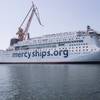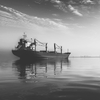Shipping Registries and Piracy Response
International shipping registries have continued to sharpen their aim taken at a longstanding maritime problem: What is the appropriate response to piracy? As attacks have shifted from Somalia to West Africa, the issue remains at top of mind.
Armed guards have proven to be a successful deterrent against attacks. Ship finance and registry lawyer Brad Berman, a Partner at Holland & Knight (H&K), sums up a sea change in views over the past year in views about guns aboard ships, telling Maritime Reporter: “A few years ago most of the shipping industry was against having weapons aboard, with strong objections from some of the national registries. Generally, the open registry system had already begun to accept armed guards.”
As Chairman of INTERTANKO’s Associate Members and a member of Council, Berman recalls early discussions on the debate.
He said, “The Northern European owners were initially strongly against armed guards; while the “cowboy” politics of at least one North American representative were debated in the hallway. Now two years later, well trained, experienced armed security teams are openly accepted.” Berman added.
“As the debate evolved, those Flag Administrations that explored the use of trained security teams found it imperative that the people with the guns were properly trained, had significant prior military experience and would be compliant with the rules.”
Issues regarding contracted guards have evolved greatly since 2008. By 2011, a consortium of industry associations BIMCO, ICS, INTERCARGO, INTERTANKO, the OCIMF and the International Group of P&I Clubs prepared a set of guidelines regarding the use of private security contractors on board ships in the Gulf of Aden.
In 2011, a group of security providers created a standard setting and information sharing body,- the Security Association of the Maritime Industry (SAMI). “SAMI has been at the vanguard of developing standards in maritime security, and the SAMI Standard has been a significant foundation of subsequent developments,” said Steven Jones, Maritime Director of SAMI.
Maritime security initiatives moved rapidly at the IMO, in contrast to the glacial pace of other regulatory initiatives. Ten years after the ISPS code, as concern about PMSCs (Private Maritime Security Companies) who provide PCASPs (Privately Contracted Armed Security Personnel) mounted, the IMO again moved quickly. The IMO’s Maritime Safety Committee meetings in 2011 (MSC 89) resulted in Interim Guidance for Flag States and for ship owners on the use of PMCSs and PCASP’s in high risk areas.
The IMO did not actually endorse the practice, saying instead, that “The carriage of armed personnel remains a matter of decision for the ship owner—after a thorough risk assessment—to request, and the Flag State to decide.” Around late 2011, two influential registries- the U.S. and the U.K. opened up the door to allowing armed guards on ships flying their colors, following the lead of white listed flag states Liberia and the Marshall Islands.
By the time of the May, 2012, meeting of the IMO’s Maritime Security Council (MSC 90), the IMO, both industry and Flag States- through the IMO, were working towards binding guidelines for PCASPs. SAMI’s Jones explained, “The work of SAMI was covered in a submission to the IMO at MSC90, and a decision was ultimately taken to pass responsibility for developing a standard to the ISO.”
Will Watson, the President of security provider AdvanFort (based outside Washington, D.C.), told Maritime Reporter: “I believe that having the standard set through ISO was clearly the right course and saved months, if not years.” Watson offered a clarification, saying: “It must be said that the IMO played a role in the development of the ISO 28007 protocol.” He also credited BIMCO (representing the owners) and SAMI.
In late 2012, the International Standards Organization (ISO) unveiled its new specification, ISO/PAS 28007:2012- which can be linked to certifications under IS) 28000:2007- a standard for supply chains. The ISO explains: “The document addresses security management system elements such as resilience, planning, resources, training and awareness, communication and documentation. It outlines operational requirements for dealing with issues such as scene and casualty management, incident reporting and investigation, health and safety, and customer complaints.”
It adds: “ISO/PAS 28007 also includes recommendations for performance evaluation such as monitoring, audits, management and continual improvement. Implementation will help security companies demonstrate their ability to provide privately contracted armed personnel on board ships.”
SAMI’s Jones said: “The association has taken an active role in the work to develop and launch ISO/PAS 28007.” He adds that SAMI’s membership decisions are still taken against the SAMI standard while the ISO certification process is refined, but ultimately entrance into SAMI will be granted to future members who are certified according to ISO/PAS 28007. He says that SAMI’s Certification partner, RTI, is on course to launch a pilot scheme for approving companies meeting ISO PAS 28007 requirements. “All the while,” he says, “…we have been working to ensure that our process will fit into the ISO structure.”
AdvanFort’s Watson suggests that the path through SAMI and the ISO allows fast-tracking because it steers around political shoals. He said: “Beginning some two years ago, SAMI had a plan to have a two stage approval process for PMSCs. The second step would have been essentially what later became ISO 28007. Now, SAMI still has State 1 certification that requires extensive vetting of PMSCs seeking the approval. Some of the leading PMSCs, including AdvanFort, have achieved this status.”
Flag States now accept the role of armed guards, with some embracing the ISO standards and some moving beyond them. The Marshall Islands has been working very closely with SAMI, and, early on, had forged an MOU with the Registry aimed at furthering the best interests of both organizations, the members, and the industry at large. Jones said “SAMI has worked with the Marshall Islands since the inception of the association, and the MOU encompasses a range of areas of co-operation and support.” AdvanFort’s Watson characterizes Liberia and the Marshalls as “…offering extensive guidance to owners and operators on the best vetting process regarding PMSCs.”
Robin Townsend, from Lloyds Register, who has been the ISO’s project leader on piracy issues, said: “The latest development of the ISO 28007 has been introduced to the IMO by Marshall Islands so they are supporters.”
The Director of Maritime Security at the Liberian Registry, Jorgen Palmbak, wrote, in a recent bulleting: “Per IMO directive, ISO has developed an ISO standard (ISO/PAS 28007) that establishes criteria for selecting companies that provide armed guards for ships. Liberia supports this initiative, not least because it helps keep out rogue pirate-hunters, avoids self-regulation and provides owners with a means to select – and flag state administrations a standard by which to audit – security providers.”
Regisries, ISO and Control
But some registries are not happy to relinquish control to the ISO. Watson said that Panama and Cyprus as two registries that have implemented their own in-house vetting and certification schemes. He said that Panama was the first to do so, and recounted a trip to Panama where he met with Eng. Alfonso Castillero, General Director of Merchant Marine, adding that: “AdvanFort passed muster with Panama, and the Registry actually included some of our Quality Assurance Program (QAP) features in its scheme.”
Jones from SAMI, tells Maritime Reporter, “It is anticipated that a number of Flag States (including Germany, Panama, Cyprus, Belgium, Croatia, Greece, Malta, the Netherlands, Luxembourg, Italy, the UK and Japan) will eventually retain their own additional requirements and processes for state specific reasons.” This is borne out by recent news flashes.
In March 2013, Malta drafted legislation described as “…the first scheme for private maritime security licensing…” by lawyers Fenech & Fenech Advocates, posted on the blog of Neptune Maritime Security. In the lawyers’ posting, they explain that the requirements for private maritime security licenses “…list more than 20 obligations, and aim to ensure that those companies that obtain a license are suitable for such sensitive and demanding activity.” The criteria include implementation of a quality management system (QMS) The lawyers add: “The policy has been well received by private maritime security companies, which are determined to ensure that only the most serious service providers are allowed to operate.”
In late April, the State news service from the Netherlands, whose ships transiting near Somalia were benefiting from protection from the Dutch naval forces, announced that: “…the cabinet will draft legislation which will enable shipping companies to hire armed personnel from private security companies under strict conditions, which are yet to be defined, for the protection of specified categories of transport in the high-risk area near Somalia.”
In late May, David Rider from Neptune, an important blogger in the space, wrote: “As predicted, Germany has become the latest Flag State to adopt a national certification process for private maritime security companies seeking to place guards onto vessels flying their flag.” He adds: “…it must demonstrate how it will ensure the suitability and reliability of its directors and its employees, while insurance is also a key issue.”
In the UK, an extra verification layer, the management accreditation agency United Kingdom Accreditation Service (UKAS) has been appointed to assess companies that have been certified to the ISO 28007 standard. MSS Global, a UK auditor specializing in private security, has announced that two PMSCs were selected for their Pilot Audit of Certification for ISO PAS 28007 as part of the UKAS pilot project. According to MSS, Port2Port Maritime Security and Castor Vali Security Risk Management are now beginning their audit assurance process in accordance with ISO 28000 (supply chains) and ISO PAS 28007, as of Spring, 2013.
There is a role for Class Societies- for example, Lloyds Register Quality Assurance (LRQA) has joined forces with a specialized risk consultant- Integrated Risk and Security Solutions (which worked with LR previously, on the ISPS code); the joint venture will be assessing companies, under the UKAS pilot program. LRQA has also entered into a joint venture with Protection Vessels International (PVI), expected to start in June.
The next frontier in maritime security will be workable and actionable rules- acceptable to the PMSCs (and to the array of other stakeholders) surrounding the use of force. A UK lawyer, David Hammond, who retired from the UK armed forces in early 2012, has been drafting a set of model rules, dubbed “The 100 Series”- the name purposely evoking Article 100, dealing with rights to a fair trial, from UNCLOS 1982.
In an interview with MSS Global, Mr. Hammond says: “In my final in-Service role as an operational naval barrister I had seen many variations of PMSC RUF [Rules on Use of Force] cross my desk. Some were robust and well written, others less so. I therefore developed a concept based upon previous frontline experience, not just as an operator, but also as an advisory lawyer having amongst other roles, assisted in drafting the Royal Navy’s Rules of Engagement for current Indian Ocean and Gulf operations.” He adds: “To date, there has not been a single internationally applicable model set of RUF against which PMSCs, home States, flag States and Registries, the insurance industry, ship owners and operators, including Masters and interested third parties, could compare and gauge the validity of the RUF that was being presented, both as part of a contractual agreement and in relation to that used during transits. There was no benchmark…”
However, as noted in a recent article by H & K’s Brad Berman, “The creation of private maritime security companies might be considered the modern equivalent of the issuing letters of marque in the 17th, 18th and early 19th centuries (historically, referred to as privateers). Letters of marque were legal decrees from a government allowing a vessel to arm itself against an attack. The privateer brought the prize vessel back to their port of origin to auction off its goods in Admiralty court. Privateers were an accepted form of defense against pirates and enemy flagged vessels in wartime on the high seas.”
Mindful of past legalities and current needs, Berman concludes: “A number of complex and difficult issues surround the piracy problem; each has an impact on the entire international shipping community. However, the resurgence of piracy is something that seafarers, shipowners, and governments must address on today’s oceans. “
(As published in the July 2013 edition of Maritime Reporter & Engineering News - www.marinelink.com)















